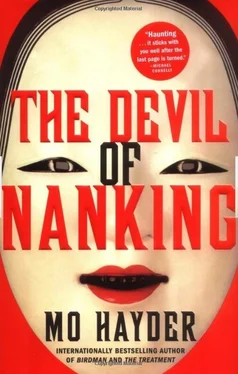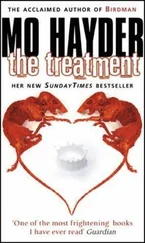‘Shujin,’ I began. ‘Shujin maybe… we should-’
‘Yes?’ She raised her eyes hopefully to mine. ‘Maybe we should…?’
I was about to answer, when a frenzied screeching came from behind me and something shot through the window, slamming into the back of my head, sending me stumbling forwards. Instantly the room was filled with a terrible sound. I cried out where I lay on the floor, my hands over my head. In the commotion a bowl shattered, water flooded across the table and Shujin jumped up, knocking her chair over in her panic. Overhead something large and shadowed ricocheted furiously from wall to wall. Cautiously, my hands protecting my face, I raised my eyes.
It was a bird, a huge, clumsy bird, flapping desperately, catapulting into the walls, bouncing off the floor. Feathers flew everywhere. Shujin was on her feet, staring at it in astonishment, as it squawked and clattered, sending things crashing down. At length it exhausted itself. It dropped to the floor, where it hopped around dejectedly for a while, bumping into walls.
Shujin and I took a step forward and peered at it in disbelief. It was a golden pheasant. The bird that some say stands for China. Unbelievable. Until today I had only ever seen a golden pheasant in paintings, I couldn’t have been more surprised had the feng huang itself flown through the window. Its orange feathers were as bright as if a fire had been lit in the centre of our house. Every time I took a step forward, it hopped away, trying to flee, colliding with the furniture. I couldn’t understand why it had burst in here. It was only when the bird took a desperate leap in the air and passed quite close to me that I saw its eyes and understood.
‘Move away,’ I told Shujin, snatching up my brocaded changpao from the chair, gathering it and casting it like a net over the bird. It panicked, jumping and beating its wings and lifting a foot or so into the air, and for a moment the gown seemed to move around the room independently – a brightly patchworked spirit slithering across the floor. Then I crouched next to it, quickly trapping the bird with both hands. I straightened, carefully peeled out the bird, exposing first its little head, its sightless eyes, then its wings so that Shujin could see.
‘It’s blind,’ I murmured.
‘Blind?’
‘Yes. Maybe the explosions at Zhonghua-’
‘No!’ Shujin’s hands flew to her face. ‘No. This is the worst of luck, the worst! A golden pheasant! China ’s bird. And blinded at the hands of the Japanese.’ She dug her fingers in her scalp like a crazed thing, looking frantically around the room as if searching for some miraculous means of escape. ‘It’s true – now it’s really going to happen. The earth, our soil. The Japanese are going to harm the earth – they’re going to destroy the dragon lines in the ground and-’
‘Hush, now. There is no such thing as a dragon line-’
‘They will destroy the dragon lines and then there will be nothing but drought and famine in China. All the pheasants will be blinded, not only this one. All of them. And all the humans too. We’ll be killed in our beds and-’
‘Shujin, please. Please keep calm. It is only a bird.’
‘No! Not only a bird – a golden pheasant! We’re all going to die.’ She was moving round the room in circles, erratic and fevered, throwing her hands up and down despairingly. ‘The president, your precious president, your supreme arbiter, has run away like a hunted dog, all the way to Chongqing, and all that’s left in Nanking are the poor and the sick and-’
‘ Enough! ’
‘Oh!’ she cried, dropping her hands and staring at me with the most intense anguish. ‘Oh – you’ll see! You’ll see! I am right.’ And with that she ran from the room, her feet thundering on the stairs.
I stood for a long time, staring after her, the blood pounding in my temples, astonished that everything had changed so rapidly. I had been ready to concede to her, prepared to flee the city. But her taunts had me leaping in defence of a position that I am quite unsure of.
I might have stood there for ever, staring at the empty staircase, had the pheasant not begun to struggle. Wearily I took its feet in one hand and whipped it through the air in the swift, curling movement my mother had taught me as a child, windmilling it down at my side as if I was shaking water from a cloth, once, twice, until the bird’s neck was broken and I was left holding only a limp clot of feathers. I locked the shutters and carried the dead bird, wings lifting feebly once in a death spasm, into the kitchen.
I rarely go into Shujin’s kitchen, but now it was the only place I wanted to be. It comforted me. When I was a boy I would sit on the floor of the kitchen and watch my mother drop chickens into boiling water to soften the feathers. Now I filled a pot with water, lit the fire and waited until the bubbles rose to the surface. Moving in a daze, I scalded the bird, holding it by the feet, then sat at the table, plucking it, scraping at the pinfeathers on the breast, letting my mind rest on the familiar picture of my mother’s kitchen. I recalled her face in the days before my father’s business began to thrive and we could afford an amah, when she would spend all day in the kitchen, patiently packing cooked ducks in salt, wrapping them in cloth for storage, winding the birds’ intestines on to a skewer to be dried out in the pantry. Chiang Kai-shek, I thought dully, wants China to look forward. But is it so simple for a nation to rip the history from inside its heart?
I finished plucking the bird and carefully tucked its head under its wing, tying it with string the way my mother used to, the way Chinese women have done for generations. Then I put it into the pot and sat, the brilliant wet feathers sticking to my arms, and watched the bloody foam rise to the surface.

Nanking, 13 December, afternoon
Last night I boarded up the house, nailing wood across every window and door. (Shujin would not help because her superstitions tell her that hammering in a nail will cause a deformity in our baby.) All evening we heard strange noises coming from the east, and before we went to bed I rested an iron bar against the spirit screen. Who knows if I will be able to use it, should the need arise? This morning we were woken by a distant rumble, like thunder, and half an hour ago Shujin filled up a pan to boil noodles for lunch. When she went to rinse her fingers the tap bucked and shuddered and only a thin brown liquid came out of it. What does this mean? Does it mean that the Japanese-
It’s happening even as I write! The single lightbulb overhead has just died. Now we are… We are in semi-darkness and I can hardly see my words on the paper. Outside the house the dying whine of failing machinery is terrible. The city is shutting down around our ears. Shujin is rummaging in the kitchen, trying to find our oil lamps, and from the end of the alley I can hear someone shouting hysterically.
I can’t sit here any longer. I can’t sit here and listen. I am going to investigate.
When I went upstairs, the house seemed very dark and cool after the hot garden. I had a bath in the echoey old bathroom, with its green mould between the tiles and the pipes all showing. I washed carefully, staring at my reflection thoughtfully, at the way the running water magnified my white skin, the silvery hairs and pores. Shi Chongming wanted me to get Fuyuki to talk. What he was saying, I was sure, was that I had to flirt with him. He meant I had to be sexy.
In the hospital they had never got tired of lecturing me about my sexual behaviour, so I decided fairly early on that it wouldn’t be very bright to tell them how I’d really felt about the boys in the van. I could guess what they’d say: ‘Ah! See? An entirely inappropriate response!’ So I didn’t admit the truth: that after the boys had all taken their turns, and we’d got dressed and were heading back along the A303 the way we’d come, I was happier than I’d ever been. I didn’t tell them how bright everything looked, with the stars shining and the white line in the road slipping under the van. The four in the back kept yelling out not to go over the bumps too quickly, and I sat in the front humming and listening to a battered tape called XTC that kept wah ing and cracking up through the van’s broken speakers. I felt light inside, as if something dark and secret had been washed out of me by the boys.
Читать дальше













